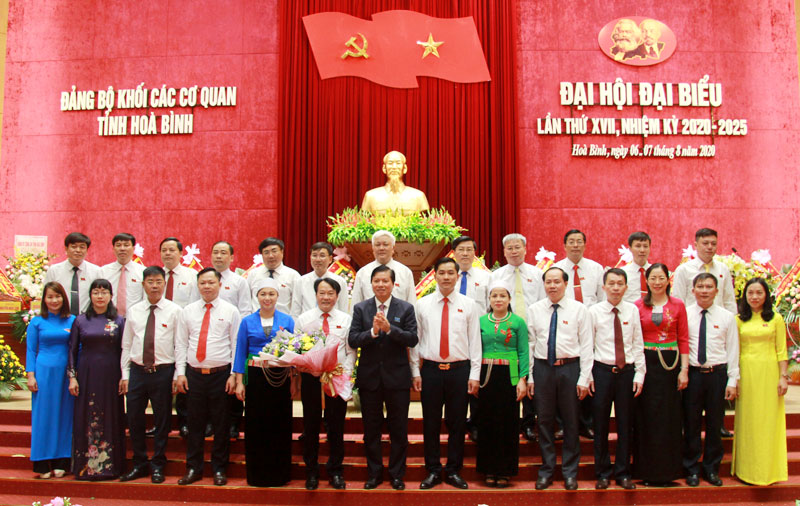
HBO) – The 17th Party Congress of the bloc of provincial agencies of Hoa Binh for the 2020-2025 tenure wrapped up on August 7 after two days of working. The event was attended by Tran Dang Ninh, Permanent Vice Secretary of the provincial Party Committee and Chairman of the provincial People’s Council, along with 200 delegates representing more than 4,200 Party members of the Party Organisation.
 Tran Dang Ninh, Permanent Vice Secretary of the provincial Party
Committee and Chairman of the provincial People’s Council, presents flowers to
congratulate the 17th-tenure Party Committee of the bloc of provincial agencies
for the 2020-2025 tenure.
Tran Dang Ninh, Permanent Vice Secretary of the provincial Party
Committee and Chairman of the provincial People’s Council, presents flowers to
congratulate the 17th-tenure Party Committee of the bloc of provincial agencies
for the 2020-2025 tenure.
The congress’s presidium reported that on the
first working day, the congress elected 25 people to the 17th-tenure Party
Committee of the bloc of provincial agencies.
At their first meeting, the new Party Committee
elected seven to its standing board. Nguyen Duc Cuong, Vice Secretary of the
16th-tenure Party Committee, was voted as Secretary of the 17th-tenure Party
Committee while Nguyen Hung Cuong was re-elected Vice Secretary.
The Party Committee also elected its inspection
board with five members, and Nguyen Quoc Hung was chosen to serve as head of
this board in the new tenure again.
All the elected officials won high numbers of
votes, and are truly eligible in terms of morality, talent, prestige and
capacity to meet requirements of task performance in the new context.
On the second working day, 37 official delegates
and two alternate ones were elected to attend the 17th provincial Party
Congress. Participants also agreed on the opinions collected for draft
documents to be submitted to the provincial Party Congress and the 13th
National Party Congress.
The 17th Party Congress of the bloc of
provincial agencies adopted its resolution, which specifies tasks and key
solutions to achieve nine main targets set for the tenure, including at least
90 percent of agencies and units "fulfilling tasks well”; 100 percent of cadres
and Party members studying the resolution of the 13th National Party Congress
and others of the Party Central Committee, the provincial Party Committee and
the Party Committee of the bloc of provincial agencies; and 100 percent of
all-level Party committees and their inspection boards building their work
regulations and fully implementing work programmes for the tenure and each
year.
The congress also approved an action plan for
the implementation of the resolution while specifying focal programmes so as to
improve the Party organisation’s leadership capacity; bring into play
democracy, solidarity and creativity; enhance discipline and sense of
responsibility towards setting examples; and successfully carry out the
resolution of the 17th Party Congress of the bloc of provincial agencies./.
Hoa Binh province is undergoing a dynamic transformation amid Vietnam’s national digital transition. Building on Poliburo’s Resolution No. 57-NQ/TW on breakthroughs in science, technology, innovation, and national digital transformation, the province has rolled out a wide range of practical action plans. A standout initiative is the "Digital Literacy for All” movement, an effort to ensure that no one is left behind in the digital era.
Hoa Binh province is undergoing a dynamic transformation in the wake of the national digital transformation movement. Building on Resolution No. 57-NQ/TW of the Politburo on breakthroughs in science, technology, innovation, and national digital transformation, the province has implemented a wide range of practical action plans. A standout initiative is the "Digital Literacy for All” movement ambitious effort to ensure that no one is left behind in the digital age.
With a spirit of unity and proactive problem-solving, the Party Committee, the government and the people of Dong Lai Commune (Tan Lac District) have made great strides in implementing the resolutions of the 24th Party Congress of the commune for the 2020 - 2025 term. Focusing on leadership and practical actions, the commune has brought the Party’s resolutions into daily life, creating strong impacts and pushing the local development forward.
Amid the nationwide push for digital transformation, young people in Hoa Binh Province are stepping up as dynamic pioneers, applying technology to enhance Youth Union operations and expand the reach of youth-led initiatives. Through creativity and adaptability, Youth Union organizations at all levels have introduced a series of practical solutions, contributing to modern governance and community development.
In recent years, An Nghia commune, located in Lac Son district, has stepped up administrative reform, focusing on improving the quality and efficiency of its single-window service unit for receiving and processing administrative procedures. These improvements have helped create favourable conditions for local residents and organisations to handle administrative procedures, contributing to the commune’s broader socio-economic development.
The Prime Minister-approved master plan to develop the multi-use value of forests ecosystems through 2030, with a vision to 2050, aims to improve the management and sustainable use of forest resources, create jobs, increase incomes, and improve the living standards of ethnic minorities, people in mountainous and remote areas, forest workers and those living near forests.



 Tran Dang Ninh, Permanent Vice Secretary of the provincial Party
Committee and Chairman of the provincial People’s Council, presents flowers to
congratulate the 17th-tenure Party Committee of the bloc of provincial agencies
for the 2020-2025 tenure.
Tran Dang Ninh, Permanent Vice Secretary of the provincial Party
Committee and Chairman of the provincial People’s Council, presents flowers to
congratulate the 17th-tenure Party Committee of the bloc of provincial agencies
for the 2020-2025 tenure.